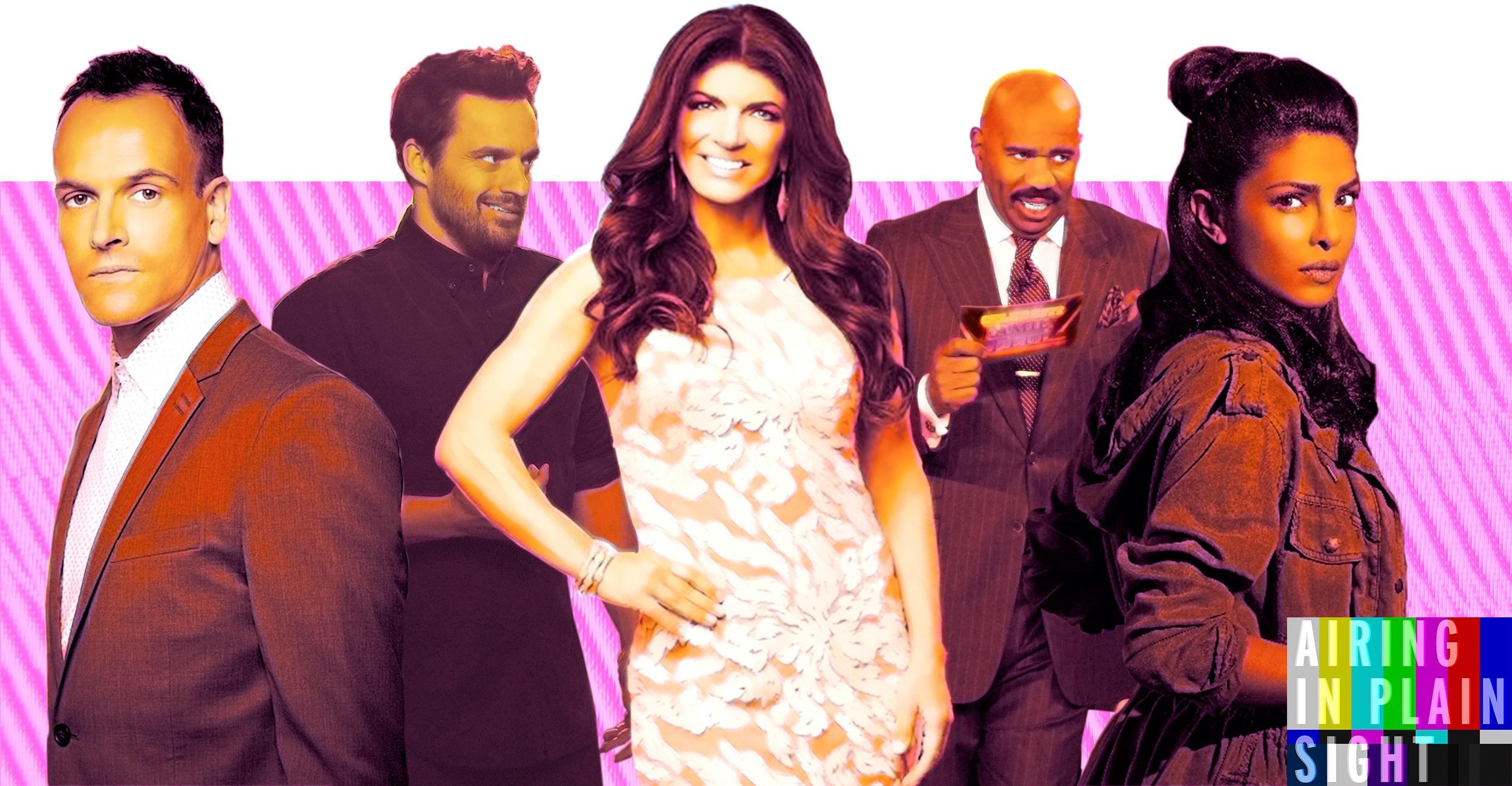We talk about TV all the time, but we hardly talk about all the TV. This week, we’re looking at the shows, people, and networks that we know people love — that we love — but that typically fall outside of the critical hivemind. This is TV Airing in Plain Sight.
You may not know it, but you have a DVR hierarchy. Everyone does. The pecking order is broken down into a few discrete groups. First, there are the shows you watch shortly after the initial broadcast, lest they get spoiled by your colleagues, friends, or Twitter — shows like Game of Thrones. Second, there are the shows you watch at the same, specified time every week (though not necessarily when they air) because you have a watch party with friends — you know, like The Bachelor. Then there’s a third group of shows: the ones you truly savor. This group comprises your TV passions — the shows you plainly enjoy and do not need to discuss on a regular basis. In fact, they’re so obviously worthwhile that it goes without saying. We recommend you carve out some DVR space for (or go back and binge watch) the following fine programs.
‘Kingdom’
Lindsay Zoladz: Imagine if The O.C. was a gritty drama about mixed martial arts. And if Sandy Cohen was, instead of a high-powered attorney, a hot-tempered ex-fighter and a current owner of an MMA gym played with gravelly depth by the one and only Frank Grillo. And if Ryan Atwood was a troubled young fighter/ex-con played by Luke from Friday Night Lights. And if Captain Oats was … OK, this metaphor is falling apart, but the point is that you should watch Kingdom, a woefully underrated show about a Southern California family that perfectly hits that sweet spot between prestige drama and oh-no-they-didn’t soap opera.
All the major characters in the Kulina family’s orbit are rendered with nuance and complexity (Jonathan Tucker is great as Grillo’s older son, Jay, a little shit with a heart of gold; Nick Jonas fits surprisingly well into the ensemble as the closeted fighter Nate), but there are also things like love triangles and mental-institution murders and prostitute moms. Oh, the intrigue! Kingdom’s fatal flaw is that it’s hidden away on the Audience Network, which up until very recently was exclusive to DirecTV subscribers. If it had landed on, say, FX, I have a feeling a hell of a lot more people would be watching it; at the very least, it would’ve given Sons of Anarchy fans something to do in their downtime. The good news is that Kingdom just got renewed for a third season, so here’s hoping 2017 will be its breakout year. That gives you plenty of time to catch up on its first two seasons. Do it! Or else endure the wrath of Frank Grillo’s disappointed dad stare.
‘Playing House’
Allison P. Davis: The darker side of female friendship is very trendy right now. Critics and audiences applaud twisted, complicated, maybe-toxic platonic female pairings — like Rachel and Quinn on Unreal or Hannah and any one of her Girls. People weirdly like them because they are more “real,” and their challenging friendships are more rewarding than, say, one that’s happy and supportive. Dark and twisted codependent friendships are important, but please don’t discount a show like Playing House that portrays a happy, sunny, zany female friendship.
As far as female buddies go, Jessica St. Clair and Lennon Parham make the friendships on Sex and the City look dark. The premise: two childhood best friends who, after a separation, find themselves living together in their childhood Connecticut home, raising a baby together. The show touches on lots of issues that could easily edge into dramedy territory — single motherhood, dating after 30, existing in a small town with a bunch of weirdos — but instead, it takes the funny, charming, sort-of-silly route. Their friendship is still complicated and the way they interact is still realistic, but it’s all through a goofy, nostalgic, and rose-colored lens. Playing House reminds me of the weirdly intimate but supportive friendships on Living Single or Friends.
It’s not the coolest show on TV, but Playing House revels in being wonderfully simple and cheerful when other shows don’t. It also allows Keegan-Michael Key to play a very dashing romantic lead. Do you like things that are cheerful and Keegan-Michael Key being dashing? Then why aren’t you watching this fantastic show?
‘The Last Ship’
Ben Lindbergh: Behold, the best 18 seconds televised this summer:
The man most viewers know as McSteamy lets “Quiet out there” hang in the air for a full three seconds — long enough for us to wonder whether he might say “ … Too quiet” before deciding that not even TNT would dare unretire the “too quiet” trope in 2016, only to be bowled over when the warmed-over words actually come out of McSteamy’s barely moving mouth. The only thing that might make this masterpiece, from the penultimate episode of The Last Ship’s third season, better would be Adam Baldwin chomping on an unlit — no, nevermind, that’s there too.
The Last Ship has no illusions about being on the “prestige TV” honor roll. There’s no subtlety to its selfless, square-jawed heroes, its scheming, scowling bad guys (and gals), or its frequent fireballs. If the show sees a way to invoke a cliché, it will in the bluntest, most Michael Bay way. A mix of military action, political intrigue, and apocalyptic contagion (with only a light dusting of sanitized romance), The Last Ship ties together strands of several other dramas. For the most part, its charismatic cast makes the material work, assuming you set your expectations somewhere toward the center on the spectrum of brilliant-to-trashy TV.
I started out liking The Last Ship ironically. At some point — maybe after Eric Dane gave me a stern talking-to on Twitter (don’t worry, we worked it out) — I let go of my last resistance. Is it “essential”? No, not really. If you have highbrow houseguests, I wouldn’t blame you for deleting it from your DVR. But it might be the most consistently fun 42 minutes in my TV rotation.
‘Family Feud’
Sean Fennessey: This summer marked the 40th anniversary of the debut of Family Feud, the Hatfields and McCoys–style survey game show that has aired in five different iterations on three different networks with six different hosts. It is the John Irving novel of American television — always there, old or new, somewhat strange but oddly familiar, cycling through characters but always about human fallacy. The latest version is hosted by Steve Harvey, who is an absurd person and thus perfectly suited to hosting Family Feud. Harvey has an inquisitive and gently chiding style — a perfect fit, since insinuation is the essence of any Family Feud host. Richard Dawson was a flirt. Ray Combs was a needler. Richard Karn was a buoyant skeptic. Louie Anderson routinely seemed as if he just didn’t want you to do this to yourself. Even John O’Hurley, the erstwhile J. Peterman of Seinfeld, comported himself with an actorly gravitas, as if each question were a sliver of David Rabe dialogue. The host of Family Feud is one of the great TV jobs.
But Harvey’s version is different from the others. It’s still manic and dumb-smart and still a little bawdy, but there’s something familial about his Family Feud. Look at him clutch the shoulder of my friend David Jacoby making an appearance on the show earlier this year:
I choose to believe that Harvey’s touch — not creepy like Dawson, or looked down from his nose, like O’Hurley — powered Jacoby to victory (never mind that he’s already completed his fast money round). After six years on the show, Harvey has become the paterfamilias, the dad who’s always home, on some channel, in syndication forever.
‘Shameless’
Katie Baker: I came to Shameless at a vulnerable time: in a cold house, late at night, snow outside, sleep-deprived, nursing a mole-like tiny baby during a time-bending maternity leave. I needed television that would meet me down on my level. It had to be outrageous enough to keep me awake and amusing enough that it wouldn’t always make me weep. Dark, morbid humor was a bonus; occasionally repulsive characters were a plus. (I needed something to counteract all the ambient Fisher-Price lullaby music.) It couldn’t be too demanding; I’m not even exactly sure which season I tuned into first.
Shameless, adapted from a British show by the same name, revolves around Frank Gallagher (William H. Macy), a despicable father of six — I’d call him deplorable, but I suspect he’s a Gary Johnson supporter — and his badass daughter, Fiona (Emmy Rossum). It’s about to start its seventh season, but you don’t hear about it much. Chicago Tribune called it “underpraised and underappreciated.” A TV.com critic wondered why no one was discussing some of the more daring plots. For a long time, I only knew it as that bizarre-looking show I saw ads for while watching other Showtime fare.
Shameless can be as deadpan as Fargo, as self-involved as You’re the Worst, and even as affecting (in its own coke-addled, harrowing, Canaryville kind of way) as Parenthood. It is a habitual line-stepper; it is your most outrageous friend. And on those lonely nights, it was oddly comforting. As I belly laughed at something particularly terrible, I found myself thankful that there were no other non-infant humans around me to judge.
‘60 Days In’
Donnie Kwak: After vicariously experiencing life on Rikers with Naz in The Night Of, I craved more time behind bars. So, on a friend’s rec, I started to binge reality-survival show 60 Days In, which premiered in March and is now in its second season. The premise: Seven non-criminals are dropped into Clark County Jail (Indiana) with fake cover stories, their true identities unknown to all but a few employees. (To explain the roaming camera crews, the real inmates are told that a production team is filming a Lockup-style documentary.) The ostensible goal of this 60-day experiment, as stated repeatedly throughout, is for participants to observe jail life and report back to the sheriff on ways to improve the facility. Much less noble is the real takeaway: Watching innocent schlubs get punked in jail is entertaining.
60 Days In hews too closely to reality formula (heavy-handed music, repetitive scenes, sleight-of-hand editing) to transcend the genre, but it does give you an intermittently suspenseful look behind the wall. Turns out most of The Real World: Jail is pretty damn uneventful, actually. Inmates watch Judge Judy on the pod’s 60-inch flatscreen, order ramen and e-cigs on touch-screen commissary kiosks, yell obscenities at each other, and scrap over tater tots. Repeat. Thrust into the quotidian routines of jail life, the smarter fake inmates adapt over time, much like Naz (minus the heroin). It’s the few who can’t assimilate who provide the show’s real spectacle. In the first season, it was the overconfident teacher Robert, whose opening salvo to fellow inmates was “Do you get the NFL Network?” (Spoiler: He didn’t make it to the end.) In the current season, we’re all waiting for the nerdy attorney Brian to tap out — he’s already been jokingly propositioned several times by nude inmates. Jail, obviously, is no place for the cocky or the meek. There’s no burning baby oil on 60 Days In, but it’s got some sinister drama nonetheless.
‘The Real Housewives of New Jersey’
Molly McHugh: Let me explain: I’m currently on a Real Housewives journey, watching each franchise all the way through and attempting to do so in chronological order. It’s like experiencing recent history as told by over-caffeinated winos who can’t use an idiom to save their lives. And I’m loving every second of it. Right now, I’m on RHONJ Season 6, which is an amazing watch for a few reasons. First: Teresa Giudice just got out of jail in December, a situation I didn’t understand then but now have caught up with all the backstory. (And everyone’s season-long insistence that only her husband will go to jail makes it all the more dramatic! How wrong they are!) Second reason: In one episode, Teresa makes a half-hearted attempt to explain why she and her husband have changed the pronunciation of their name, something that has confused me throughout this series — finally, a resolution! (The resolution is that her father-in-law corrected them and it’s dee-chay, not dice.)
Third reason: Dina! Dina’s back! I am very sad that Dina is back and Caroline is not and they have not reunited yet, but this update on Dina’s life is so appreciated.
Fourth reason: I think I’ve found the true beginnings of the baggy-meets-fashionable-athleisure craze.
Fifth reason: It’s really fun when people ask you what you’ve been watching and you reference a two-year-old TV show full of cultural events they’re likely already aware of. Also, anyone interested in this program has already seen the latest episode, so you literally never have to say “Spoiler alert!” when talking about how Amber’s husband Jim is a total piece of crap, can you believe what he did on the Miami vacation!?
Sixth reason: The Today Show news clips used to move Teresa’s story line along are like a tiny trip back into time, a time when Matt Lauer had slightly more hair and the most controversial Real Housewives incident was the Giudices’ legal drama and not Brooks Ayers’s fake cancer. Join me and travel back to this simpler time!
‘New Girl’
Sam Schube: Maybe the kindest thing I can say about New Girl is that the show could be — should be! — far more infuriating than it is. Zooey Deschanel’s Jess is impossibly twee, the three main galoots she lives with only infrequently perform recognizable human behavior, and they all work jobs (elementary school teacher, cop, something something marketing something, terrible bartender) that don’t quite square with the football field–sized loft they share. There’s that, too: They live in a loft. In downtown Los Angeles, which, have you heard? It’s cool now. (They were here before that, OK?) The gang plays a drinking game about American history and carries out story lines about texting. It should be awful, a paint-by-numbers update of Friends for the millennial set. But it’s to the show’s credit (and to showrunner-slash-blogger Liz Meriwether’s) that somehow it isn’t. Instead, it’s kind and bighearted and even naive — all estimable qualities at a time when “characters who are mean to each other” is a sign that a comedy is getting it right. New Girl is not the best show on television — but I could think of worse friends to spend half an hour with each week.
‘Animal Kingdom’
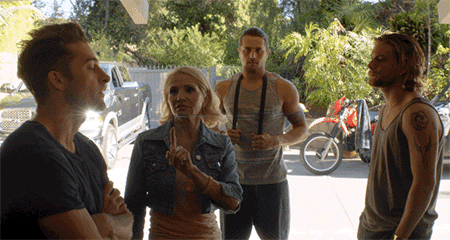
‘Quantico’
Mallory Rubin: Everyone on Quantico is exceptionally good looking. Not in the standard “everyone on TV is usually good looking unless a person is cast specifically to be unpleasant looking” way, but in an overpowering, almost shocking fashion that is simultaneously thrilling and disarming. The characters’ faces are so smooth, their hair so lush, their abs so chiseled that it can be tough to focus on anything else, specifically how ambitious the show’s dual-timeline approach actually is. Quantico might seem like a cheesy, overly sexualized look at the perils of patriotism, and it totally is! But it’s also … pretty good!
Maintaining “whodunnit” suspense across a network-length season is hard, but Quantico pulled it off in its freshman campaign, brushing just enough mischief across every notable character’s pristine pearly whites to keep a dozen red herrings in play until the (very attractive) traitor was finally revealed. That would have been impressive enough, but maintaining the parallel structure that swung us in and out of the leads’ FBI history and present-day careers elevated the experience far beyond the standard procedural, much like Priyanka Chopra’s pouty grin puts mere mortals’ pencil-thin lips to shame. I have no idea if Season 2 will be able to replicate the surprise and the sizzle, but I know that I’ll tune in to find out.
‘Elementary’
Micah Peters: Elementary was admittedly more of a “must watch” in its first three seasons, when it was still keeping up the pretense of a simple modern-day reimagining of the Sherlock Holmes stories, occasionally turning left where Sir Arthur Conan Doyle’s hearthside tales hung a right. In the show’s adolescence, the gender flip in Holmes’ dutiful companion was fresh, and Joan Watson (Lucy Liu) was flirting with the idea of staying on full-time as a partner to Sherlock (Jonny Lee Miller), a heroin addict she helped to reform who can readily identify 240 different types of tobacco ash; it was a fun narrative arc to follow. Heading into its fifth season in October, Elementary’s settled into the comfortable routine of a network crime procedural, and as network crime procedurals go, this one is consistently rewarding. That’s mostly due to the fact that, unlike BBC’s Sherlock, the show doesn’t exist solely for its main protagonist. Captain Gregson (Aidan Quinn) and Detective Marcus Bell (Jon Michael Hill), for example, are both dynamic characters with their own hopes and dreams and trials and tribulations.
That being said, Holmes and Watson are still, without question, the show’s strongest characters. Their banter about misanthropy and introversion serves as the best filler, and they have a massive mental database of ridiculously granular knowledge about strange and seemingly mundane shit. It produces some hilariously convenient “eureka” moments: Sherlock runs a finger down a tendril of hair on a dead man’s head in the morgue, This man died at 5:06 p.m. yesterday within three blocks of the Navy Shipyard. Joan notices a fleck of yellow paint on a floor molding, Oh, that’s this rare shade called ochre, it has this hydrated iron oxide that makes it — you know what, get your keys I know EXACTLY where the killer is, we can go to his house.
‘Behind Bars: Rookie Year’
Shea Serrano: The show that I’m watching on TV that no one else is watching is Behind Bars: Rookie Year. It’s a documentary series about correctional officers working their first year at the Penitentiary of New Mexico, famous for being the home to one of the deadliest prison riots in American history (33 inmates were killed in 1980).
I am a fan of prison shows in general (Lockup is the GOAT), but this one is extra interesting because of the built-in angle: watching the new C.O.s, oftentimes too small and too afraid, trying to figure out how to exist among hundreds and hundreds of inmates. Here’s one of the C.O.s. His name is Fabian. He’s 18 years old:
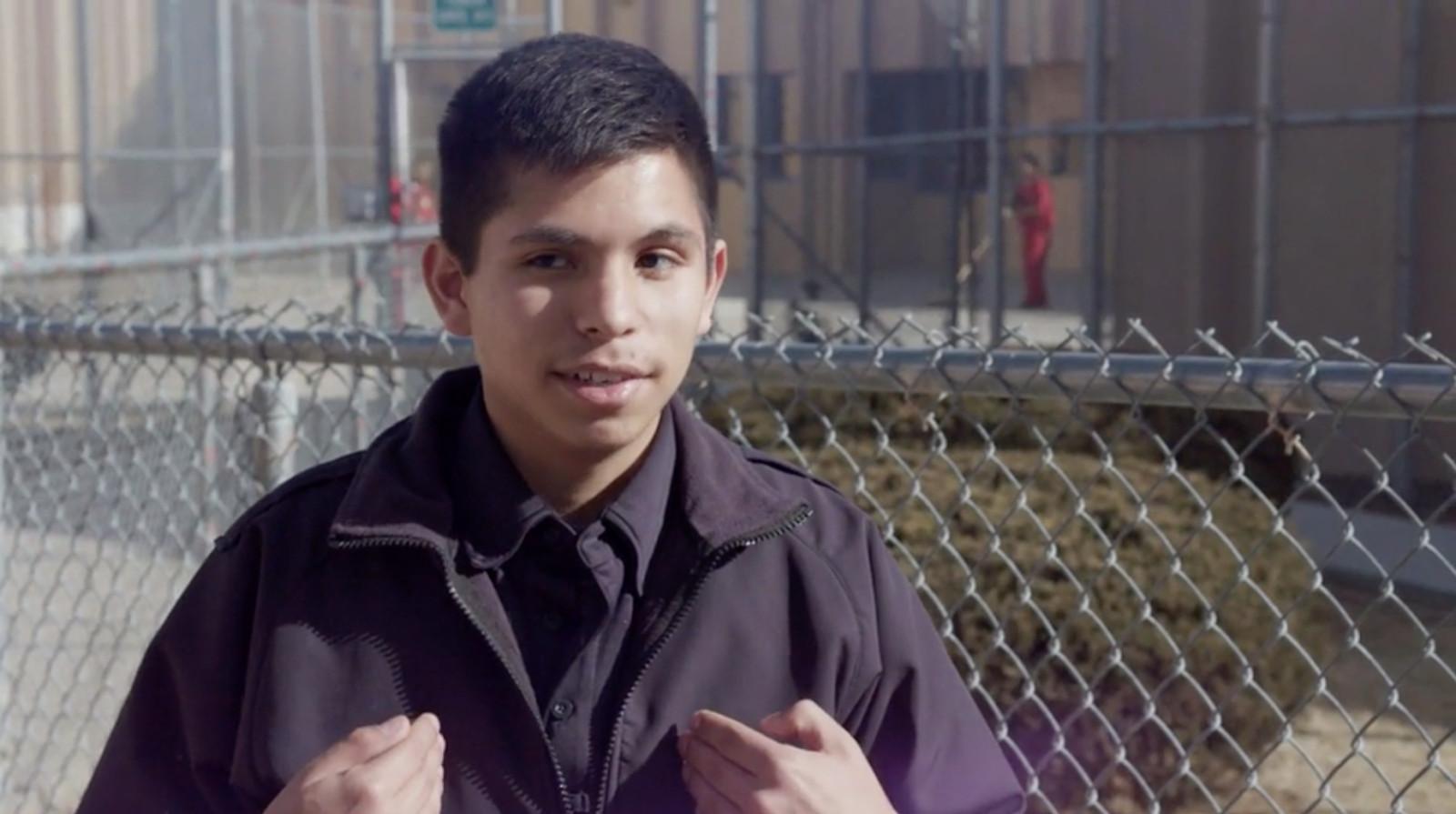
In this particular picture, he’s talking about how he’s not sure how to make the inmates listen to him because he looks like that, and they look like this:
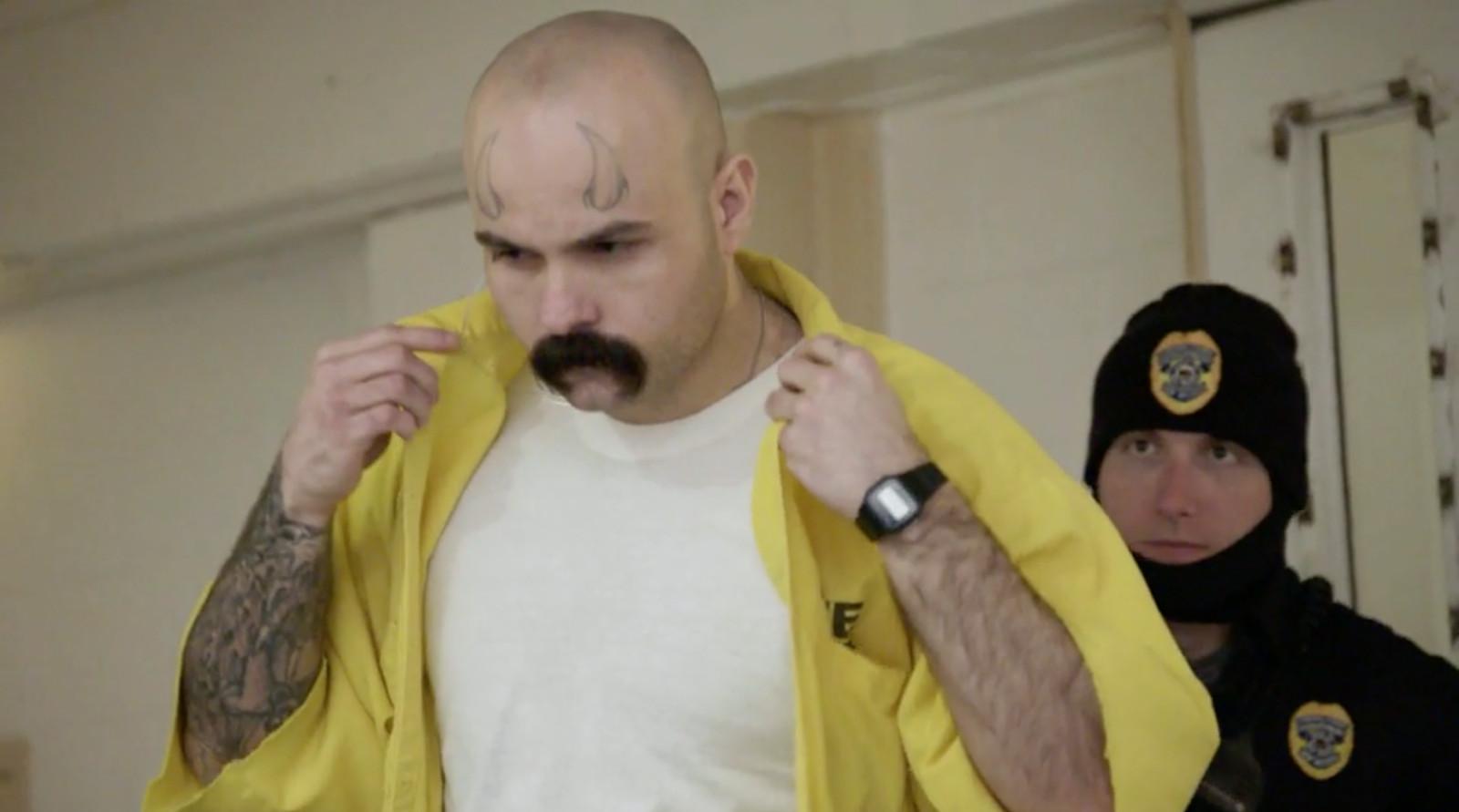
Those are devil horns tattooed on his head.
Here’s another guard. This is Lilly. She is 5 feet tall and weighs 102 pounds:
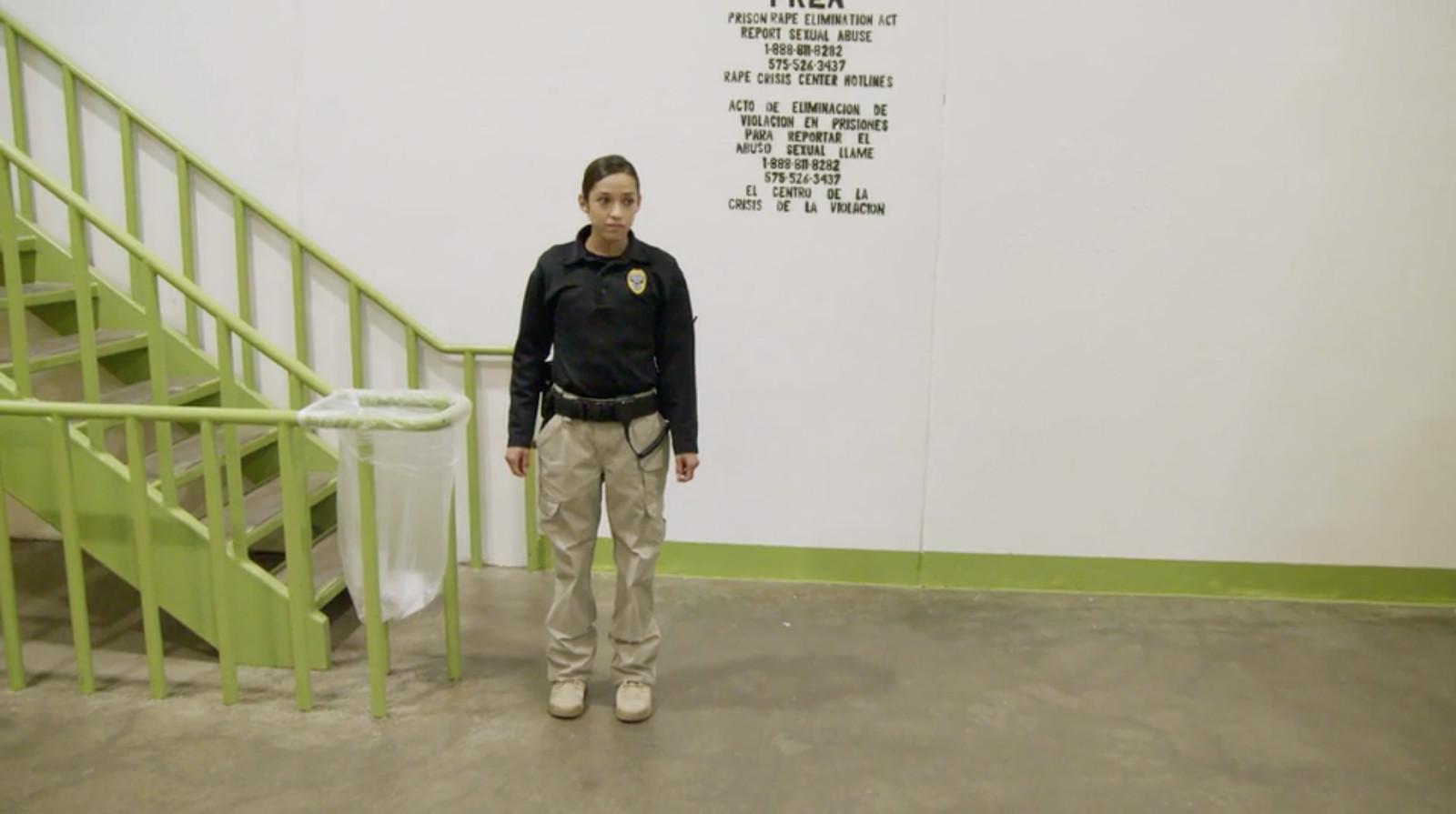
Here’s Lilly about to pat down an inmate:
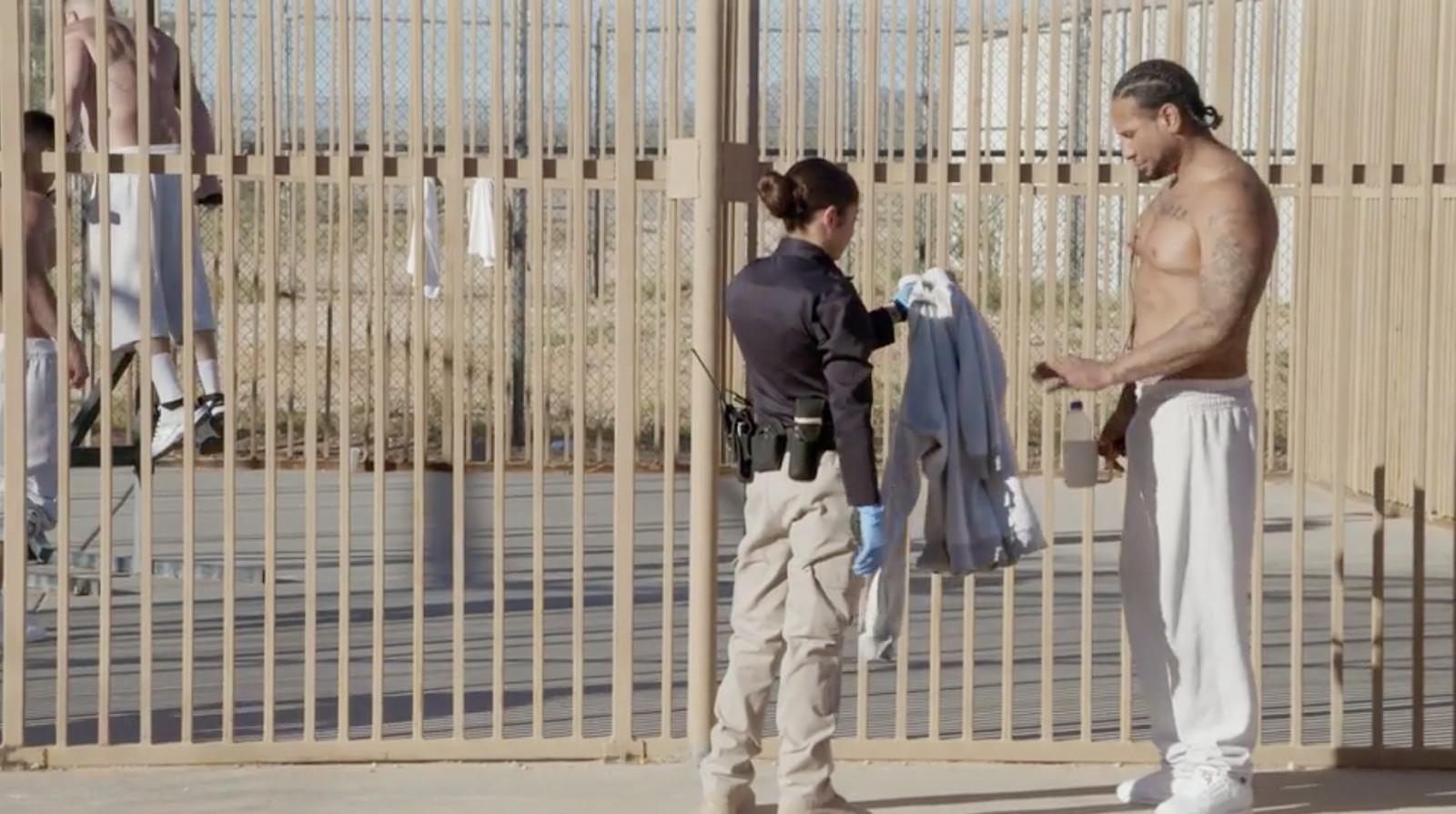
I don’t know what day Behind Bars comes on each week. I don’t know what time it comes on either. And I’m only halfway certain I even know what channel it’s on. It just sort of appears on my DVR at random. But when it does, I watch it.
‘Brooklyn Nine-Nine’
Alison Herman: We are living in what is certainly the worst possible time for a lighthearted workplace sitcom set in a police department (and not just any police department — the NYPD!). It’s to Brooklyn Nine-Nine’s credit that over three resolutely goofy seasons, it’s subtly argued the opposite: that if we ever needed a utopian vision of a diverse, humane, even silly police force, it’s in 2016. It’s a similar M.O. to distant-cousin Parks and Recreation’s take on local government, and it works for the same reason: an ensemble whose characters feel chemically engineered to mix memorable specificity with broad comedy. There’s the will-they-won’t-they-they-totally-will, the badass, the hardbodied softie, and Andre Braugher presiding over it all with an Emmy-nominated straight face. Watching the cast bounce off each other in ever-shifting combinations makes for perfect comfort TV … that also happens to involve drug busts.
‘Naked and Afraid XL’
Jason Concepcion: Reality TV traffics in humiliation. What’s interesting about Naked and Afraid XL is how the show’s combination of nudity and extreme environment takes humiliation totally out of the equation. On most reality shows, even other outdoor survival shows, eating something gross is a stunt. On XL, it feels necessary.
In a 2013 interview with Salon, Denise Contis (one of the executive producers of the yet-to-be-aired reality series Naked and Afraid) was asked the salient question: Why the nudity?
“I think what we were always looking to do with the producers was develop the ultimate survival show,” said Contin, also an executive vice president at Discovery. “A survival show where our cast of survivalists really had to rely on their body and their brain. What’s the quintessential survival show that allows for that?” She continued, “It wasn’t where we had, ‘Oh, here’s the show, oh, and by the way, let’s have them be naked!’ No, not at all.”
Not at all!
Listen, no person involved in television, or the entertainment business at large, or who has any kind of product to sell needs to explain: Why the nudity?
In regular NaA, a man and a woman (both outdoorsy people), are placed into some wild environment (naked), given one or two tools each (knife and a canteen are always good choices), and must survive for 21 days before hiking to the extraction point. Each episode generally follows the same trajectory: Contestants enter the wilderness, strip buck nude, meet each other, and gradually realize what they’re doing is much harder than they thought it would be.
In XL, the concept is the same. But the number of contestants increases to 12 — six male and six female — and the group is tasked with surviving for 40 days in the wilderness.
The things that go down on Naked and Afraid XL — the bickering over food, the smoldering feelings of disrespect, and the way people respond to an ailing cast mate by either trying to help or viewing them as an impediment — are like the source code for human interactions.
One of the big arguments in XL Season 2 occurred when two dudes left the main group on a hunting expedition. After a couple of days of not killing anything, they argued over the bow and arrow. The disagreement seemed petty at first, like siblings arguing over a toy. Gradually it became clear that the row was less about the bow, and more about what happens when a person’s self-identity is shaken. When the two returned to the group, their stories about what happened differed slightly. No one was lying, but the distrust was corrosive. Grown men wept openly. Unlike many reality shows, it seemed really real.
‘Roadies’
Sam Donsky: After I watched the first episode of Roadies — Cameron Crowe’s ode to this one Frightened Rabbit song he was listening to the other day that, seriously, I’m telling you, you have to hear, you really just have to, it’s sooo good, you have to, here, put these headphones on and, wait no, where are you going, you haven’t even listened yet, now take them, yes, the headphones I mean, and PUT THEM THE FUCK ON [eats Snickers, feels like self again] — I knew it was going belong to a very specific genre of TV. I would give it the Blair Waldorf eyeroll several times per hour. I would tweet rude things about it with impunity. I would smash the heart on several articles about where it went wrong. And I would watch every episode.
Which, I know what you’re thinking. There’s a word for that: hate-watch. Except there isn’t, really — because I didn’t hate it at all. I loved watching Roadies. I still haven’t quite figured out why — a part of me thinks it goes back to that old line that Crowe wrote, years ago, for Philip Seymour Hoffman in Almost Famous: “The only true currency in this bankrupt world is what you share with someone else when you’re uncool.” I always thought it was a bad line — awkward and obvious and overwritten — and still mostly do. But I like that with Roadies it came true anyway. The world is bankrupt. I’m not cool. And Cameron Crowe and I have his stupid television show.
